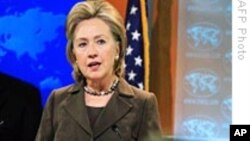Following months of debate among U.S. government agencies, the Obama administration has spelled out a new strategy on Sudan. It includes incentives for curbing Sudan government fueling of a deadly six-year war in its western Darfur region and urgent measures to support implementation of a 2005 north-south comprehensive peace deal (CPA) for southern Sudan.
Secretary of State Hillary Clinton unveiled the new administration benchmarks yesterday in Washington, accompanied by a written statement from President Obama, vowing tough, new sanctions against Khartoum for its Darfur war policies, which the United States since 2004 has regarded as the carrying out of genocide.
Sam Bell, the executive director of the Genocide Intervention Network, says that U.S. activist groups are generally pleased with the administration’s new approach, but that only time will tell if the unspecified measures will have an impact on the Bashir regime.
“It all depends on whether the principals are going to take the time, really invest the high-level energy at the outset to end the crisis and to avoid a much larger crisis in Sudan that could take place with future events, including a planned election and a possible secession of south Sudan,” he said.
Bell cautions U.S. policymakers not to pin their hopes on an incentives package for Khartoum, since he explains that the government of President Omar Hassan al-Bashir has been known to comply only when pushed by hard-nose real politik pressures.
“This is a government that does two things: one, it is more responsive to pressure than to incentives. And so that’s why we’ve emphasized so much that pressure has to be an important part of what the administration goes about doing in Sudan. And the second thing is the administration in Khartoum is very willing to sign things and to say yes. But when it comes actually to implementing agreements, be they in south Sudan, be they in Darfur, be they humanitarian, political, having to do with peacekeepers, across the board, their modus operandi has been to say yes and do the opposite," said Bell.
For Khartoum, Bell says the biggest prize to obtain from cooperating with Washington is normalized relations with the United States and an incentive of lifting the international sanctions that have been placed on Sudan for the past decade. Sam Bell says that anti-genocide groups should feel encouraged by Secretary Clinton’s presentation on Monday because it rejected any tradeoffs of western goals being pursued in Khartoum at the expense of any other regional objectives being sought.
“What I was encouraged by, was two things Secretary Clinton said. One is that the three priorities, implementing CPA, getting a Darfur peace deal, and ensuring that Sudan does not go against U.S. interests in terms of support for terrorism, she said clearly that none of those priorities would be traded off,” he noted.
Bell also said that Clinton stressed Washington’s determination not just to reach agreements with Khartoum, but to see that those agreements are implemented. But he says he hopes U.S. officials will back up their outline with action.
“Hillary Clinton showed up to roll out this policy. But tomorrow, is she getting on the phone with her Chinese counterpart? Is she getting on the phone with Sudan’s neighbors? Are we saying to our European partners that the issue of Sudan is a top priority for the Obama administration? We want them to come on board on x, y, z issues. That’s where this is going to make or break whether or not the strategy will be successful,” he said.
The Genocide Intervention Network and other U.S. activist groups were encouraged during the 2008 presidential campaign by candidate Barack Obama’s pledge to isolate Sudan, toughen sanctions against President Bashir, and make Sudan a higher priority of U.S. policymaking.
The pace with which that policy has unfolded has been caught up in internal debate between administration officials like U.S. ambassador to the U.N. Sudan Rice, who has advocated a tougher approach toward Sudan, and Washington’s special envoy to Sudan, Major General Scott Gration.
Gration has surprised many activist groups with his emphasis on fostering a more cooperative approach since April to prevent a fragile confederacy between the Khartoum government and semi-autonomous southern Sudan from collapsing. Bell says being prepared to pursue the tougher approach is essential and that Monday’s warning by President Obama of new sanctions if Khartoum resists peace efforts should be taken seriously in both Washington and Khartoum.
“A lot of the pressures that would be most effective take a lot of groundwork, and it takes months sometimes to get these initiatives in place where they can actually be effective. And so even if the administration today is not ready to announce a pressures policy, I hope that behind the scenes, they’re doing the groundwork so that if it’s necessary in three months or four months, they’ll be ready and able to do it,” he said.
Despite calls from a group of Darfur expatriates living in the United States for Ambassador Gration to step down as Sudan special envoy, the Genocide Intervention Network’s Sam Bell says many members of the anti-genocide coalition still welcome Gration’s participation on the Obama team.
“We do think that he needs more support, above all, more staff, and more support from the principals, from Secretary Clinton, from President Obama. And I think that Special Envoy Gration with this strategy, we’re going to give him the benefit of the doubt and say tomorrow is a new day. Here is a new strategy, and we’re going to hold him to implementation of this strategy,” said Bell.




